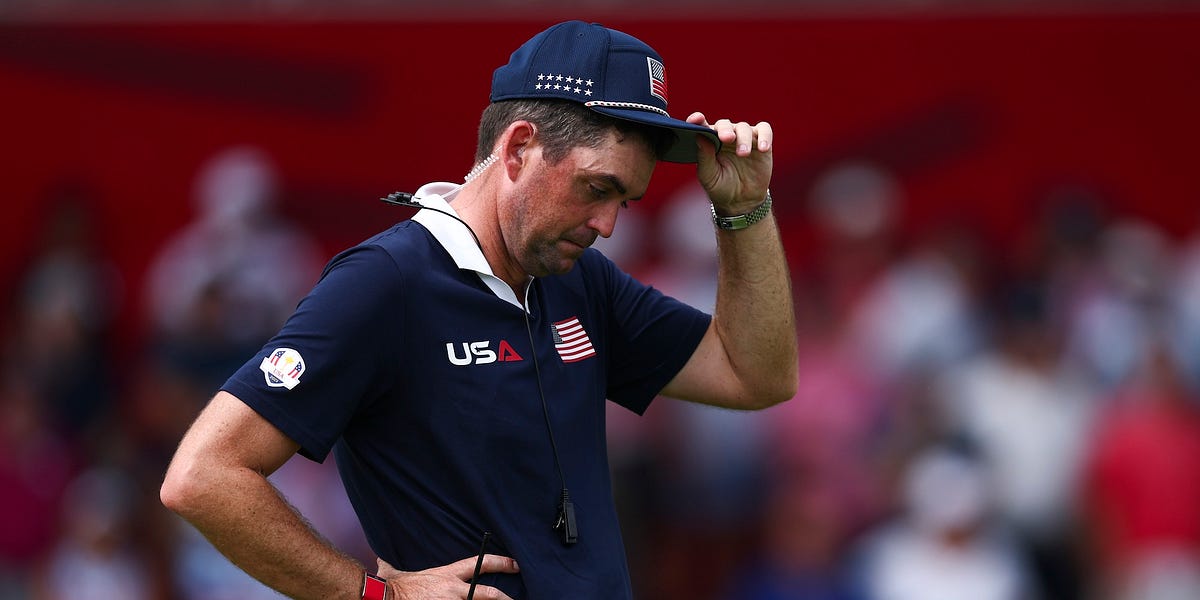 Captain Keegan Bradley (Maddie Meyer/PGA of America)
Captain Keegan Bradley (Maddie Meyer/PGA of America)
Champions, Cutmakers, and now, the Quad’s first-ever two-part (Point) Missers. Because the point-missing continues as we sent this to the printing press.
Keegan Bradley. The stock post-USA loss disclaimer: the Captain does not hit the shots and has only so much power to save a sinking U.S.S. Club Car. The Captain has to deal with PGA of America numskulls lurking around every corner, offering laceratingly dull stories and terrible lineup suggestions. But a Ryder Cup Captain also can put players in a position to succeed and is empowered to make lineup calls when someone is off their game. Early on, Bradley appeared to pull the right strings by getting his team to Napa so they’d remain sharp and get to know each other (a promised team trip to Bethpage did not happen). He appeared to create a positive spirit around the squad. There have been no stories of communication failures or unexplained pivots from the plan he publicly said was set long ago. (The catty comms gripes traditionally take a while to dribble out).
Bradley’s first massive blunder started wth not scheduling four-ball sessions to start, as is the home captain’s prerogative and traditionally is a better format for Americans. He then put together quite possibly the worst foursomes pairing since 2018 when Jim Furyk sent Bubba Watson and Phil Mickelson out in Paris and minus a team of whitecoat-wearing, Freudian-trained observers armed with strait jackets. I’m referring to Friday’s opening foursomes duo of Bryson DeChambeau and Justin Thomas (who anyone could make a four-ball case for). Then there was the even more heavily criticized duo of Collin Morikawa and Harris English because Data Golf said it was a bad idea. But the duo made sense from a temperament and style perspective—until they got walloped by McIlroy and Fleetwood and somehow were sent out again Saturday morning.
“You know, we’ve got a lot of faith in our players,” he said. “Collin Morikawa has won a couple majors.” Whoa. Those were in 2020 and 2021. But go on. “Harris has had a great year.I think in the past, sometimes we have panicked with the pairings and switched everything up, and it hasn’t worked out. We wanted to stick with the plan, and that’s what we did.” Oh, you did.
The Captain may not hit the shots but he does control narratives and perception. In his role as frontman, arbiter of dignity, leader, and in Bradley’s case as the “younger-and-touch-with-todays-players” guy, he forgot the first rule of the Ryder Cup or any team event: good sportsmanship and leaving everyone feeling better about a contest conducted with dignity.
Saturday’s disastrous press conference came after a long, brutal day but that still does not excuse some of the idiotic assertions Bradley made. He revealed that he’s living in 1995 when Europeans were playing slow greens and shocked by American agronomic standards. Mark James and Howard Clark were not this year’s opposition. Bradley seemed oblivious to what was going on or was not informed of it by his Vice Captain’s. He’s yet to apologize publicly to the guests from Europe, yet former Captain Tom Watson did…from his couch.
“I thought the fans were passionate,” Bradley said. “I mean, their home team is getting beat bad. You know, they are passionate fans. I wasn’t at Rome, but I heard a lot of stories that Rome was pretty violent as well.” Oh it’s been violent a time or two in Rome, just not this century and certainly not at the 2023 Ryder Cup. “The fans of New York, from what I have seen, have been pretty good. You’re always going to have a few people that cross the line, and that’s unfortunate.” Guess he hasn’t read any Samuel Ryder lately.
“I was happy to see our players trying to quiet down some people that were like that. Part of it is our fault. We are not playing up to the standards that they want to see, and they are angry, and they should be.”
He’s right. Part of it is was his team’s fault and fans were angry so they took it out on the visiting team in a bid to make the matches closer.
Wait, not true?
Q. You said the way your players have played is maybe partly to blame for some of the fans crossing the line —
KEEGAN BRADLEY: I did not say that. That’s not what I said. I said the fans are probably upset that their home team is losing. I did not say that.
Q. But do you think maybe you bear some responsibility in terms of some of the words that you and your players used beforehand in terms of stoking up the fans to bring a hostile environment?
KEEGAN BRADLEY: What words were those?
Q. To bring chaos and just talking up the atmosphere here, Collin —
KEEGAN BRADLEY: Yeah, Ryder Cups are wild. I don’t appreciate those words that you just said. I know what you’re trying to do. The Ryder Cup is full of passionate fans. They’re full of passionate players. And that wasn’t right.
In a low point not seen but witnessed by the reporters present, Bradley wanted to confront the reporter afterwards for asking questions based entirely on what he said. Again, it’s a long day and his team took a rough beating, and there is only so much a Captain can control. But maintaining dignity and handing off the privilege of Captaining the USA team in a good place could have been within his control had he voiced stronger disdain for the bad apples. Instead, he came off as an out-of-touch Point Misser.

Plans. Bradley’s mantra sounded a lot like past losing Captains and speaks to a longtime American culture of not having a cohesive culture that bruises no egos by adjusting on the fly. After becoming Captain, Bradley sounded like someone who might use his passion and knowledge of sports to take the data and find that elusive sweet spot between overreliance on analytics versus adjusting on the fly. The Europeans stick to plans because they are usually more thoughtfully conceived, they are honest with themselves about their weaknesses, and have built a culture where players can handle bad news when the Captain calls an audible. Bradley admitted that his plan had been made a while ago as a defense for sticking with Morikawa and English, an odd confirmation that he did not account for the state of certain players’ games, the course setup “surprise,” or how best to exploit the strengths of his team.
 Keegan Bradley (center) with vice captains Webb Simpson, Brandt Snedeker, Kevin Kisner, and Gary Woodland (Michael Reaves/PGA of America)
Keegan Bradley (center) with vice captains Webb Simpson, Brandt Snedeker, Kevin Kisner, and Gary Woodland (Michael Reaves/PGA of America)
Vice Captains. As the European buggy brigade actively monitored matches and took on some of the fan policing duties mismanaged by the PGA of America, America’s walkie-talkie chatters perfected the art of grim-faced, arm-crossing uselessness. There were rumblings they discussed “we need to speed the greens up” over the airwaves in what was an admission they did not know how advanced planning or agronomy works. Future Captains, they are not. The VC’s also should have been more involved in policing the jackwagons so players like Justin Thomas did not have to. It was also shocking how unaware Bradley seemed about stuff that took place when answering press softballs. Were the VC’s not telling him about anything about, say, the Hovland injury and long-established rules? Or about the slurs hurled by fans who might have backed off if sports-fan Bradley said, “cut it out”? Bradley even suggested Sunday night that it did not rain when discussing the soft conditions. Okay, maybe that weirdness is not on the VCs. But either way, nice custom-made A-J’s. Now, every time you put on your red-white-and-blue Jordans, you’ll be reminded of the Buffoonery At Bethpage.
Data. You’re a dinosaur in 2025 if you don’t believe every question can be answered with quantifiable answers. The same ones that also feed sponsor activations, promote sports betting, and satisfy point-missers who think athletes are actually humanoids executing a “base reality” simulation for a pre-planned outcome. But another match play event has come and gone with a sizable number of folks in positions of responsibility point-missing the layers of match play. The mysteries, the vagaries, and the nuances of the format cannot be quantified. Both teams know this, so they attempt to blend stats with gut instincts. It turned out that in a biennial tradition unlike any other, one team’s braintrust managed art and science better than the other. Again.







